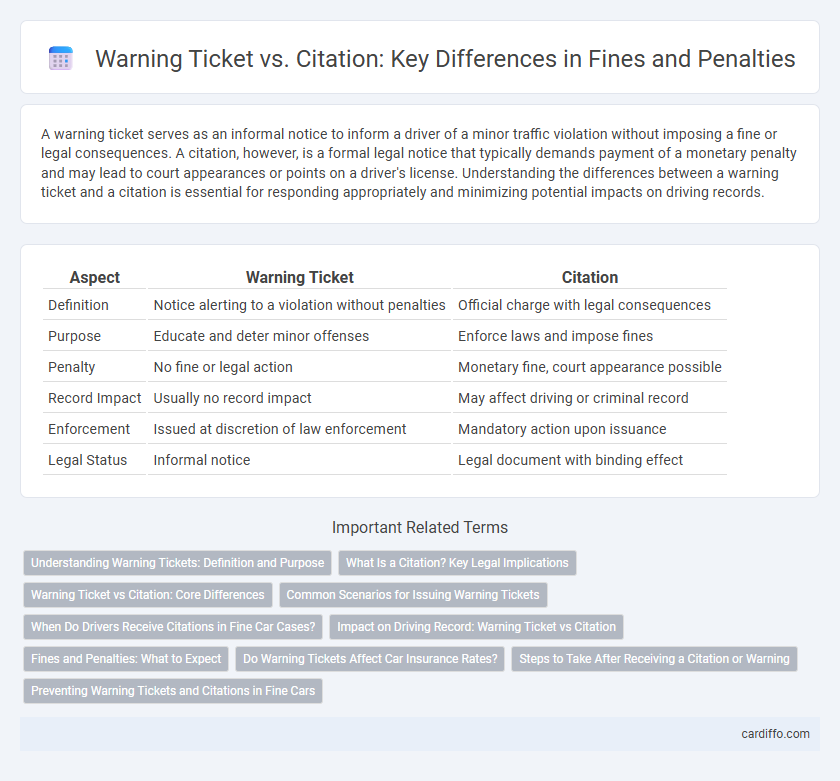A warning ticket serves as an informal notice to inform a driver of a minor traffic violation without imposing a fine or legal consequences. A citation, however, is a formal legal notice that typically demands payment of a monetary penalty and may lead to court appearances or points on a driver's license. Understanding the differences between a warning ticket and a citation is essential for responding appropriately and minimizing potential impacts on driving records.
Table of Comparison
| Aspect | Warning Ticket | Citation |
|---|---|---|
| Definition | Notice alerting to a violation without penalties | Official charge with legal consequences |
| Purpose | Educate and deter minor offenses | Enforce laws and impose fines |
| Penalty | No fine or legal action | Monetary fine, court appearance possible |
| Record Impact | Usually no record impact | May affect driving or criminal record |
| Enforcement | Issued at discretion of law enforcement | Mandatory action upon issuance |
| Legal Status | Informal notice | Legal document with binding effect |
Understanding Warning Tickets: Definition and Purpose
Warning tickets serve as formal notices issued by law enforcement to inform individuals of a minor infraction without imposing a fine or legal penalty. Their primary purpose is educational, helping recipients recognize and correct behavior to prevent future violations. Warning tickets differ from citations by lacking immediate legal consequences, emphasizing compliance over punishment.
What Is a Citation? Key Legal Implications
A citation is an official legal notice issued by law enforcement that requires the recipient to appear in court or pay a fine for a specific violation, such as a traffic offense. Unlike warning tickets, citations have legal consequences including potential court records, fines, and points on one's driving record, which can impact insurance rates and driving privileges. Failure to respond to a citation can lead to additional penalties such as license suspension or warrants for arrest.
Warning Ticket vs Citation: Core Differences
A warning ticket serves as an official notice alerting a driver to a traffic violation without imposing a fine or points on their driving record, whereas a citation is a formal legal notice that typically results in a monetary penalty and can affect insurance rates. Warning tickets are often issued for minor infractions to encourage compliance, while citations are reserved for more serious or repeated offenses requiring formal enforcement. Understanding the distinction between warning tickets and citations is crucial for drivers to comprehend the legal and financial implications of each.
Common Scenarios for Issuing Warning Tickets
Warning tickets are commonly issued in scenarios involving minor infractions, such as small parking violations, expired vehicle registration, or minor equipment issues like a broken tail light. These warnings serve as an official notice without financial penalties, aimed at educating drivers to correct behavior before more serious citations are issued. Law enforcement officers often use warning tickets to address first-time offenses or situations where the violation poses minimal risk to public safety.
When Do Drivers Receive Citations in Fine Car Cases?
Drivers receive citations in fine car cases when they commit violations that are explicitly defined as punishable offenses under traffic laws, such as speeding, running red lights, or driving without proper registration. Law enforcement officers issue citations instead of warning tickets when the infraction poses a significant safety risk or when there is a history of repeated violations by the driver. Citations result in formal penalties that may include fines, points on the driver's license, or court appearances, whereas warning tickets serve as cautionary notices without immediate legal consequences.
Impact on Driving Record: Warning Ticket vs Citation
A warning ticket typically does not affect a driving record, as it serves as a formal notice without legal penalties, whereas a citation is recorded and may add points to the driver's license, potentially leading to increased insurance rates. Citations can remain on a driving record for several years, influencing future traffic stops and license renewals. Insurance companies often review citation history to adjust premiums, making citations more impactful financially and legally than warning tickets.
Fines and Penalties: What to Expect
Warning tickets typically do not involve fines or court fees, serving as a formal caution without a financial penalty. Citations carry mandatory fines that vary by jurisdiction and offense severity, often requiring payment or a court appearance. Failure to respond to a citation can result in escalated penalties, including additional fines, license suspension, or even arrest warrants.
Do Warning Tickets Affect Car Insurance Rates?
Warning tickets typically do not affect car insurance rates because they are not formal violations and do not appear on your driving record. Insurance companies base premium changes on recorded infractions like citations, which indicate legal responsibility for a traffic violation. While warnings serve as alerts to improve driving behavior, they generally do not influence insurance costs or lead to increased premiums.
Steps to Take After Receiving a Citation or Warning
After receiving a citation or warning, carefully review the details to understand the violation and any deadlines for response or payment. Gather relevant documents such as your driver's license, vehicle registration, and insurance to prepare for potential hearings or disputes. Prompt action, including paying fines or attending court, helps avoid additional penalties or legal consequences.
Preventing Warning Tickets and Citations in Fine Cars
Preventing warning tickets and citations in fine cars requires adhering to traffic laws and maintaining safe driving habits, such as obeying speed limits and signaling lane changes promptly. Utilizing advanced driver assistance systems (ADAS) found in luxury vehicles can reduce human error and alert drivers to potential violations before they occur. Regular vehicle inspections and staying informed about local traffic regulations further minimize the risk of receiving tickets or citations.
Warning ticket vs Citation Infographic

 cardiffo.com
cardiffo.com